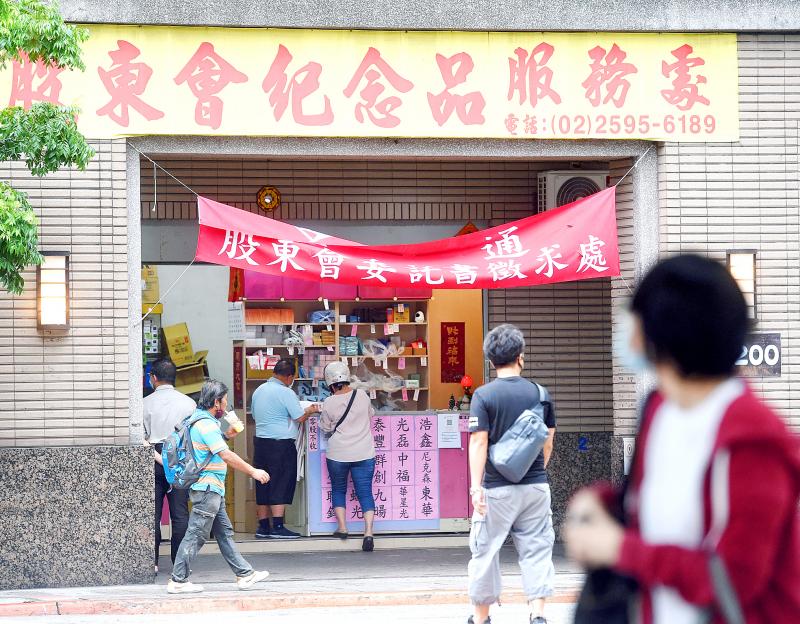A ban on listed companies holding annual general meetings (AGMs) is to be lifted after Wednesday next week, the Financial Supervisory Commission (FSC) said yesterday.
A total of 446 companies plan to hold AGMs next month, but the number of participants per room must not exceed five, it added.
The commission does not think it is necessary to extend the AGM ban, as the number of COVID-19 cases has been declining, it said in a videoconference.

Photo: Fang Pin-chao, Taipei Times
The commission on May 20 announced the ban on AGMs from May 24 to Wednesday next week to curb public gatherings, affecting 1,931 companies, which were asked to postpone the meetings to next month or August.
Among the 446 companies that have applied to hold their AGM next month, 54 companies had more than 50 investors and nine had more than 100 investors attend their meetings last year, Securities and Futures Bureau Deputy Director Kuo Chia-chun (郭佳君) said.
Companies have to adhere to the Central Epidemic Command Center’s (CECC) rules limiting indoor gatherings to five people.
For companies planning to accommodate more than five people, they have to set up more rooms to comply with CECC rules, and ensure that connections between companies and shareholders is smooth, Kuo said.
Although the commission cannot fine or punish noncompliant companies, local city governments have said that they would inspect to see if companies follow the rules, Kuo said.
Most of the 446 companies told the commission that they would use more than one room for AGMs to ensure safety and follow disease prevention measures, she added.

South Korea’s equity benchmark yesterday crossed a new milestone just a month after surpassing the once-unthinkable 5,000 mark as surging global memory demand powers the country’s biggest chipmakers. The KOSPI advanced as much as 2.6 percent to a record 6,123, with Samsung Electronics Co and SK Hynix Inc each gaining more than 2 percent. With the benchmark now up 45 percent this year, South Korea’s stock market capitalization has also moved past France’s, following last month’s overtaking of Germany’s. Long overlooked by foreign funds, despite being undervalued, South Korean stocks have now emerged as clear winners in the global market. The so-called “artificial intelligence

‘SEISMIC SHIFT’: The researcher forecast there would be about 1.1 billion mobile shipments this year, down from 1.26 billion the prior year and erasing years of gains The global smartphone market is expected to contract 12.9 percent this year due to the unprecedented memorychip shortage, marking “a crisis like no other,” researcher International Data Corp (IDC) said. The new forecast, a dramatic revision down from earlier estimates, gives the latest accounting of the ongoing memory crunch that is affecting every corner of the electronics industry. The demand for advanced memory to power artificial intelligence (AI) tasks has drained global supply until well into next year and jeopardizes the business model of many smartphone makers. IDC forecast about 1.1 billion mobile shipments this year, down from 1.26 billion the prior

Chinese artificial intelligence (AI) start-up DeepSeek’s (深度求索) latest AI model, set to be released as soon as next week, was trained on Nvidia Corp’s most advanced AI chip, the Blackwell, a senior official of US President Donald Trump’s administration said on Monday, in what could represent a violation of US export controls. The US believes DeepSeek will remove the technical indicators that might reveal its use of American AI chips, the official said, adding that the Blackwells are likely clustered at its data center in Inner Mongolia, an autonomous region of China. The person declined to say how the US government received

People stand in a Pokemon store in Tokyo on Thursday. One of the world highest-grossing franchises is celebrated its 30th anniversary yesterday.